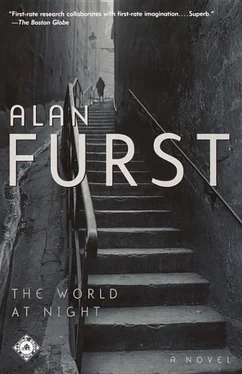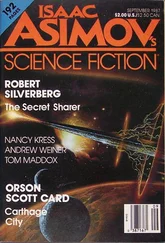Alan Furst - The World at Night
Здесь есть возможность читать онлайн «Alan Furst - The World at Night» весь текст электронной книги совершенно бесплатно (целиком полную версию без сокращений). В некоторых случаях можно слушать аудио, скачать через торрент в формате fb2 и присутствует краткое содержание. Жанр: Шпионский детектив, на английском языке. Описание произведения, (предисловие) а так же отзывы посетителей доступны на портале библиотеки ЛибКат.
- Название:The World at Night
- Автор:
- Жанр:
- Год:неизвестен
- ISBN:нет данных
- Рейтинг книги:5 / 5. Голосов: 1
-
Избранное:Добавить в избранное
- Отзывы:
-
Ваша оценка:
- 100
- 1
- 2
- 3
- 4
- 5
The World at Night: краткое содержание, описание и аннотация
Предлагаем к чтению аннотацию, описание, краткое содержание или предисловие (зависит от того, что написал сам автор книги «The World at Night»). Если вы не нашли необходимую информацию о книге — напишите в комментариях, мы постараемся отыскать её.
The World at Night — читать онлайн бесплатно полную книгу (весь текст) целиком
Ниже представлен текст книги, разбитый по страницам. Система сохранения места последней прочитанной страницы, позволяет с удобством читать онлайн бесплатно книгу «The World at Night», без необходимости каждый раз заново искать на чём Вы остановились. Поставьте закладку, и сможете в любой момент перейти на страницу, на которой закончили чтение.
Интервал:
Закладка:
He waved Casson on, down the road toward Paris.
Salaud. Don’t come back here.
10 June, 1941.
“Hello?”
“Good morning. I was wondering if you might have a life of Verdi, something nice, for a gift.”
“The composer?”
“Yes.”
“I’m not sure, we may very well have something. Can we call you back?”
“Yes. I’m at 63 26 08 .”
“All right. We’ll be in touch.”
“Good-bye.”
“Good-bye.”
This time they met in the church of Notre-Dame de Secours, then walked in the Pere-Lachaise cemetery. At the gate, Mathieu bought a bouquet of anemones from an old woman.
They walked up the hill to the older districts, past the crumbling tombs of vanished nobility, past the Polish exiles, past the artists. They left the path at the Twenty-fourth Division and stood before the grave of Corot.
“Are you sure of the doctor?” Mathieu asked.
“No. Not really.”
“But the patient, can return to work?”
“Yes.”
“We’ll want him to work on the twenty-third.”
“It won’t be a problem.”
“His arrangements?”
“He’s up in Belleville, in the Arab district. Above a Moroccan restaurant-Star of the East on rue Pelleport. If he can stand the couscous, from dawn to midnight, he’ll be fine. I suggested to the owner that the wound was received in an affair of family honor, in the south, somewhere below Marseilles. ”
“Corsica.”
“Yes.”
Mathieu gave a brief, dry laugh. “Corsica, yes. That’s very good. The owner is someone you know?”
“No. A newspaper advertisement, room for rent. I put on a pair of dark glasses, paid three months in advance.”
Mathieu laughed again. “And for the rest?”
“Hidden. Deep and dark, where it will never be found.”
“I’ll take your word for it. When are you going to make contact?”
“Today.”
“That sounds right. Difficult things-the sooner the better.”
“Difficult-” Casson said. It was a lot worse than difficult.
Mathieu smiled a certain way, he meant it was no easier for him, that he was just as scared as Casson was.
Making sure that nobody was looking at them, Mathieu took a folded square of paper from his pocket and slipped it among the stems of the anemones. Then he leaned over, placed the flowers on the tomb.
“Corot,” Casson said.
“Yes,” Mathieu said. “He’s off by himself, over here.”
They walked back down the hill together, then shook hands at the boulevard corner and said good-bye. “They’ll make you go over it, you know. Again and again. From a number of angles,” Mathieu said.
Casson nodded that he knew that, then turned and walked to the Metro.
It was Singer who picked him up in a black Traction Avant Citroen on the evening of 15 June and drove him out to the brick villa in Vernouillet. The parlor, even as the weather warmed up, still felt dark and damp and unused. Millau had a technician with him, a man who wore earphones and operated a wire recorder to take down what Casson said.
Millau had just shaved-a tiny nick freshly made on the line of the jaw. He worked in shirtsleeves, his jacket hung in a closet, but despite the suggestion of informality the shirt was freshly pressed and laundered a sparkling white. He was, evidently, going to meet someone important later that evening. Only after they’d greeted each other and made small talk did Casson realize he’d been wrong about that. Jean Casson was the someone important-the shave and the white shirt were for, well, not so much him as an important moment in Millau’s life.
Mathieu had been right. He was made to go over the story again and again. He was comfortable with plots and characters, had spent much of his professional life in meetings where people said things like what if Duval doesn’t return until the following evening? That gave him a slight advantage but not all that much, and the mistakes were always there, waiting for him. Perhaps they wouldn’t be noticed. He’d changed the Alencon names to code names-fish. Merlan drove the car, Rouget the truck, Angouille sat beside him, the shotgun on his lap.
It ran, he hoped, seamlessly into the truth: the single-engine Lysander a single-engine Lysander, the pilot young and gangling and rather awkward, and the navigation guides were as they’d been: signal lights along the track, locomotive fireboxes, and the glow of moonlight on the steel rails. They had come in at 8,000 feet over St.-Malo, were later hit by an antiaircraft burst-Millau nodded at that. The copilot was slightly wounded. The shipment included radio crystals and money, Sten guns and plastique.
“And where is it now?” Millau asked.
“In the store room of an empty shop, down among the old furniture workshops in the faubourg St.-Antoine. I bought the droit de bail- the lease-from an old couple who retired to Canada just at the beginning of the war. It was for a long time a cremerie- you can still smell the cheese. The address is eighty-eight, rue des Citeaux, just off the avenue St.-Antoine, about a minute’s walk from the hospital. In the back of the shop is a storage locker, lead lined, no doubt for cold storage using blocks of ice. The shipment is in there, I’ve padlocked the door, here are the keys.”
“You bought it direct? From Canada?”
“From a broker in Paris. LaMontaine.”
“Who is expected to come there?”
“They haven’t told me that. Only that it must be kept safe and secure.”
“Who said that, exactly?”
“Merlan.”
“Beard and spectacles.”
“No, the tall one who drove the car.”
“When did he say it?”
“The last thing, before I left. I would be contacted, he said.”
“How?”
“At home.”
“The Bourdon address?”
“Yes.”
“Good. That simplifies things for us. It will be of great interest, of course, to see who collects the explosive and spends the money, who uses the radio crystals-to send what information. It’s like a complicated web, that reaches here and there, and grows constantly. It may be a long time before we do anything. In these operations you must be thorough, you have to get it all. You’ll see-before it’s done it will involve husbands and wives, lovers and childhood friends, brothers and sisters, and the local florist. Love finds a way, you see. And we find out.”
“Clearly, you are experienced.”
Millau permitted himself a brief, tight smile of pleasure in his achievement. “Practice makes perfect,” he said. “We’ve been taking these networks apart since 1933, in Germany. Now in France, we’ve had one or two-we’ll have more. No offense meant, my friend, but the French, compared to the German communist cells, well, what can one say.”
He would remember the evening as a certain moment, almost a freeze-frame; three men looking up at him from a table on the crowded terrasse of a restaurant, Fouquet as it happened, on a warm evening. All around them, a sea of faces, the world at night-desire and cunning, love and greed, the usual. A Brueghel of Paris in the second spring of the war.
Casson had been driven back to the city by Singer, asked by Millau to join him “and some friends” for a drink. As he approached, the men at the table-Millau with his fine eyeglasses and cigar, and two pale bulky northern men, Herr X and Herr Y, looked up and smiled. Ah, here he is! Superbly faked smiles- how much we admire you .
They chatted for a time, nothing all that important, a conversation among men of the world, no fools, long past idealism. Poor Europe, decadent and weak, very nearly gobbled up by the Bolshevik monster. But for them. Not said, but clearly understood.
Читать дальшеИнтервал:
Закладка:
Похожие книги на «The World at Night»
Представляем Вашему вниманию похожие книги на «The World at Night» списком для выбора. Мы отобрали схожую по названию и смыслу литературу в надежде предоставить читателям больше вариантов отыскать новые, интересные, ещё непрочитанные произведения.
Обсуждение, отзывы о книге «The World at Night» и просто собственные мнения читателей. Оставьте ваши комментарии, напишите, что Вы думаете о произведении, его смысле или главных героях. Укажите что конкретно понравилось, а что нет, и почему Вы так считаете.












